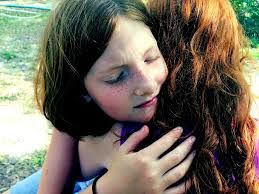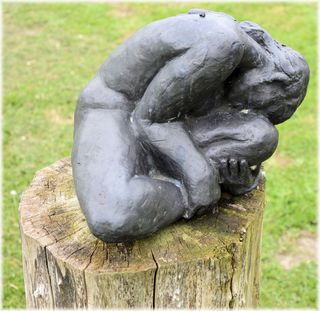Grief
Is Depression Apart from Grief or a Part of Grief?
Dissimilar to depression, here are some of the best ways to cope with grief.
Posted May 17, 2017

The title above alludes to a really tricky question. And a complicated one, too. For the answer to this two-part inquiry is, well, “Yes” and “Yes.” Let me explain:
Similarities Between Grief and Depression
Many aspects fundamental to depression also represent features common to grief. For example, whether you’re in a state of bereavement or marked depression, you’ll likely experience:
- considerable sorrow, or outright despair;
- fits of crying on the one hand, and feelings of numbness on the other;
- fatigue, or substantially decreased energy; lethargy, and maybe exhaustion;
- poor quality sleep, or insomnia;
- reduced appetite and weight loss;
- decreased ability to concentrate;
- feelings of loneliness and detachment from others;
- increased chance of contracting some medical illness (for both woeful conditions can weaken your immune system); and
- apathy, or loss of enthusiasm, in pursuits that previously were meaningful or joyful to you.
Moreover, if you’re afflicted with what’s known as complicated, prolonged or chronic grief, the above symptoms won’t remit over time and, similar to major depressive disorder, may include strong feelings of anger, highly irritable moods, and suicidal thoughts or actions.
Distinguishing Grief From Depression
So, how do grief and depression differ? Regardless of their many similarities, it’s essential to distinguish between these two gloomy states of mind and feeling. And this is so because (1) grief, unless it becomes protracted, is actually essential to healing from serious loss, whereas depression can be far more hazardous—to your work, relationships, self-care, and even self-image; and (2) the best ways for you to cope with, and finally overcome, your grief vary considerably from what may be optimal in treating a depressive episode.

Here are some of the differences between grief and depression:
- Unless you’re so seized by grief that it takes indefinite hold of you, with sufficient time, support, self-nurturing, and gradual refocusing on other aspects of your life, you’ll come to accept your new, altered reality. That is, the intense pain of losing someone who felt indispensable to your well-being will lessen over time. On the contrary, if the negative circumstances, general sense of hopelessness, ennui, or self-talk connected to your depression aren’t proactively dealt with, depression can haunt you indefinitely. Which is to say it’s unlikely to dissipate merely by the passage of time.
- Grief tends to occur in waves; it has an ebb and flow to it. Although forlorn feelings can easily—and unpredictably—be triggered, when you grieve you recall happy periods as well as sad ones. Unless you’re continuously obsessing about your loss, you’ll experience intervals of relief. But significant depression (vs. a “blue mood”) may not only be more persistent and agitated but also more pervasive. It’s an uninvited, entirely unwelcome, “adversary” that’s unremitting and may refuse to leave you alone—not even to sleep at night, which, of course, will further intensify your depression.
- Feelings of guilt and remorse are certainly possible with grief, but they’re not inherently linked to it either. However, exaggerated and irrational guilt is extremely common in depression, which is replete with self-blaming and—recrimination.
- Typically, your self-esteem and self-confidence don’t deteriorate due to loss, but the magnified self-negation, and feelings of worthlessness, inadequacy, and hopelessness linked to depression are endemic to it.
- If you’re grieving you can still (at least subsequent to its onset) handle most of the challenges of day-to-day living, whereas performing even simple acts (like brushing your teeth, taking a shower, or feeding yourself) can be compellingly difficult when you’re plagued with depression. Plus, when you’re in the throes of depression your capacity to function normally—domestically, socially, and vocationally—is likely to be significantly impaired.
- Grieving itself won’t influence your memory or verbal fluency, but depression can affect not only your recall but your speech—both in its delivery (i.e., it’s slowed down) and coherence. When you’re that despondent, cognitive functioning generally takes a hit.
Treating the Emotional Disturbance That Defines Grief
So, contrary to the agony of depression, how do you best deal with the turmoil of grief?
Treating bereavement—vs. depression—through medication has long been debated. For unless your grief becomes chronic or debilitating, it’s a natural, not pathological, state and will resolve in time. But, as duly noted on one website ("Grief vs Depression—Similarities and Differences," by Nancy Schimelpfening, verywell.com, Nov 10, 2016):
- If anxiety relating to grief is so severe that handling day-to-day responsibilities becomes untenable, then anti-anxiety meds may be useful.
- If grief is preventing you from being able to sleep, then taking a short-term prescription drug for insomnia may be appropriate.
- If the grief meets the criteria for Major Depressive Disorder (in other words, you’re actually suffering from both), antidepressants may be helpful (though, I’d add that since these meds muffle feelings that need to be felt in order to be worked through, such prescriptions could interfere with the grieving process—so one shouldn't be too hasty in resorting to them).
In short, trying to obstruct or obliterate normal grief is not a good idea. If you suppress it through medication, substance abuse or other addictions, or any activity that merely puts off grieving or helps you evade it, you’ll never be able to truly “complete” the healthy process of letting go of what had been so highly valued by you. And that’s what you must do if you’re to start the next chapter of your life. It’s been said that the only way out is through, and this maxim sharply describes the way grief works—or at least should work.
There are many things you can do to avoid getting overwhelmed by grief. Chief among them is seeking out support: from a trusted friend, relative, mental health professional, or a grief support group (in person or online), so you won’t feel so alone is your misery. Here the rather cynical expression “misery loves company” can be (connotatively) turned upside down. For you want—and should have—company in your grieving, and there’s nothing particularly self-indulgent or self-pitying about it. The understanding and compassion that sympathetic others can offer you for your loss can significantly facilitate your healing.
Reading a few of the many articles and books on the subject can also aid in your recovery (e.g., see ). The more you can educate yourself about this sad but universal experience the better. And one of the advantages of such learning is that it will help you feel less isolated, less alone, in your unsettling ordeal. It can also be inspiring to read about those who’ve felt what you’re feeling now—and have worked through it.
You can also let yourself cry, curse, write ardent missives to the deceased, etc. to therapeutically vent your mourning (vs. endeavoring to keep it all inside). This is an excellent time to journal about your feelings and who you’ve lost, paying loving tribute to them—even “continuing,” though in absentia, to talk to them. As compellingly noted in Mitch Albom’s Tuesdays with Morrie, “Death ends a life, not a relationship.” For your heartfelt connection to the deceased can go on internally. (And for a more extensive list of healing recommendations, see “Tips to Help Yourself in Times of Grief,” by Angela Morrow, verywell.com, April 13, 2017.)

Handling grief well is crucial. Otherwise, you could sink into the morass of prolonged depression. And once you slip into that wet, marshy ground, it can be most difficult to extricate yourself.
So if you’ve recently lost a loved one, do all you can to assuage your grief—rather than, over time, get hopelessly, haplessly entangled in it.
If you could relate to this post and think others you know might also, please consider forwarding its link.
To check out other posts I’ve done for Psychology Today online—on a broad variety of psychological topics—click here.
© 2017 Leon F. Seltzer, Ph.D. All Rights Reserved.
Finally, to be notified whenever I post something new, I invite readers to join me on Facebook—as well as on Twitter where, additionally, you can follow my various psychological and philosophical musings.




